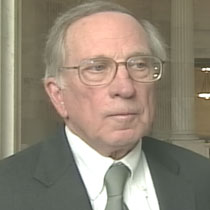2007年VOA标准英语-Former US Senator Expresses Concern Over Growin(在线收听)
Washington
13 April 2007
Former U.S. Senator Sam Nunn has dedicated much of his career to reducing global threats from weapons of mass destruction. He is currently the co-chairman of the Nuclear Threat Initiative, a private group working to decrease such threats worldwide. In an interview with VOA, Nunn expressed concern that the risk of such an attack is growing, as we hear in this report from correspondent Meredith Buel in Washington.
More than 15 years ago, the U.S. Congress approved the Cooperative Threat Reduction Program. The legislation provides funding to the former Soviet states to dismantle their nuclear, biological and chemical weapons.
In the years since the program began, thousands of nuclear warheads have been dismantled, and hundreds of intercontinental ballistic missiles have been destroyed.
 |
| Sam Nunn |
Despite those efforts, Nunn says, the risk of such weapons being used today is growing, not receding.
He says more than 40 countries have enough highly enriched uranium to make a nuclear bomb.
The former senator says the rise of global terrorism and the availability of technology increase the likelihood of a nuclear attack.
"The ability now to discover or find out how to make a nuclear weapon and the knowledge that is proliferated to lots of individuals around the globe, that is a totally different thing than we faced 20-years ago," he said. "You combine all of that, and you have got a very dangerous situation."
Nunn says countries such as Iran and North Korea are, as he puts it, pushing international will to the brink by developing nuclear technology, and in the case of North Korea, producing nuclear weapons.
He says there are stockpiles of loosely guarded nuclear weapons-grade material scattered around the world, offering tempting targets for theft or sale.
"So the first step is to secure the material everywhere it is, wherever it is on the face of the earth," he said. "That takes cooperation of lots of different countries. As I view it, we are in a race between cooperation and catastrophe, and, right now, the outcome is unclear."
Nunn says the potential for conflict among the major powers, most notably between the United States and Russia, has dramatically declined.
However, he says, nations with and without nuclear arms must embrace the vision of a world free of nuclear weapons.
"The United States is not going to give up our nuclear weapons without other countries giving them up, and that is the same for everybody that has nuclear weapons," said Nunn.
"But, if all of our countries that have nuclear weapons insist we are going to retain them forever, we are going to have a lot more company in that circle. That is a world I do not want to leave to my children and grandchildren," he continued.
Nunn says nations must redouble efforts to resolve regional conflicts, if the world is to reduce the incentive for acquiring nuclear weapons in places such as the Middle East, southwest Asia and the Korean peninsula.
He says potential regional confrontations create tensions that shape the security outlook for the entire world.